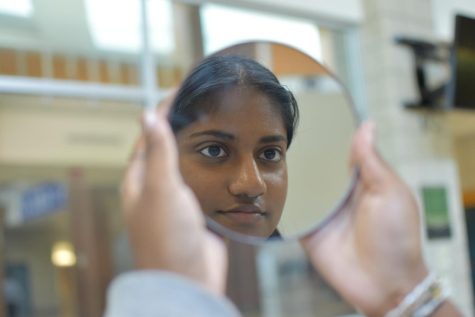
Senior Peyton “Pey” Henney has been posting on her fitness Instagram since September 2019. According to Henney, she wanted to make the account to teach people about self love and healthy ways to develop a relationship with their bodies.
On TikTok, Henney is known not only for her fitness content, but also for her faith and self improvement journey, but despite the aesthetic nature of her videos, she said she isn’t a fan of most self-improvement trends.
“No one is 100% ‘it girl’ or 100% perfect all the time. We have acne breakouts, we have real life. We cry. Life is real,” she said. “I also started to notice every time I would think, ‘I’m so glad (something in my life I want to grow past) happened, I would end up feeling horrible the next day. I would feel like a fraud for posting about it.”
On TikTok, the tag “#itgirl” has received over 2 billion views, and “#glowup” has received over 64.9 billion views on the platform. These trends depict people discussing how to improve their lives and change their appearance to boost their public image and self-confidence.
Henney, however, said she does not think these trends are accurate to their intentions.
“I think (an ‘it girl’ is) someone who is good at pretending,” she said. “I definitely believe that you can enrich your life and some of the people out there truly are enjoying their best life, but I can say from personal experience, (while I posted aesthetic content) I was doing horrible during that moment.”
Junior Karishma Sankar, who said she thinks the term “glow up” is used for surface level advancements more than genuine growth.
“I think glow ups are overused in not the best way. I think (glow ups) are, or at least should be, when someone feels more confident and powerful in who they are and love themselves no matter what they look like,” Sankar said.
Henney agrees that self worth should be more reliant on one’s beliefs and qualities rather than outward appearance. She said while she enjoys viewing “glow up” media, she appreciates vulnerable and honest content in contrast to the “highlight reel” of social media.
“I feel like being vulnerable on such a large platform is difficult, but it’s also so beneficial to so many people,” Henney said.
According to recent Pew Research Center research, approximately 84% of adults under the age of 30 use some sort of social media platform frequently. With such a large percentage of the population using social media, Sankar warned the comparison people experience due to inauthentic content can become dangerous.
Recent studies support Sankar’s beliefs. According to a study reported by JMIR Publications, a Digital Health journal, increased social media use can lead to feelings of inadequacy and increased levels of anxiety and depression.
Many of these studies focus on teenage girls; however, Sankar said she thinks men’s experiences are overshadowed.
“(Comparison happens to) both guys and girls alike,” Sankar said. “Girls are more socially talked about because girls open up more. I feel like guys go through the same thing but are told they can’t talk about it, especially with teenagers, because we have so many emotions we don’t understand.”
Similar to how Henney said she finds benefits in working out when she separates the action from the “glow up” mentality, Shane Schmidt, boys varsity soccer head coach and social studies teacher, said the members of the soccer team are improved by their experience not only in athletics, but also as a person.
“At some point in time, the majority of all high school athletes’ athletic careers come to an end, but they are still going to be a human being contributing to society and everything else. And if we can help round that and be a positive member of society, then we’ve done a good job,” Schmidt said.
Howard said she thinks views on self-improvement, regardless of gender, should be shifted to personal change instead of skills or anything externally observable.
“(Thinking about how other people see you) isn’t healthy. If you’re striving to be healthy and happy that’s what matters,” she said.
Sankar said she agreed with Howard, and additionally said the pressure to make yourself better can cause more damage than good.
“It is perfectly fine (to exist) just the way you are and that you shouldn’t be putting so much effort into changing them to look a certain way or to be like someone they idolize,” Sankar said. “Everyone is different. That’s what makes humanity so special. Everyone is different, and I think surrounding yourself with the people that you know, love and respect you for who you are is really important.”
Henney said that with her increased social media presence she is becoming more comfortable in her current state. She said she is more reliant on being positive and kind than trying to be better at everything she does.

“I very much believe that the energy that you put out is the energy that you receive. So if you are having a positive mood, like it is very much like scientifically, like, your brain follows the patterns,” Henney said, “So if you’re always negative, you’re always judging people, you’re always just being people like, that’s the naturally your brain likes patterns, and it’s going to follow that pattern.”
Henney attributed many student’s beliefs coming from others viewing this school as a competitive and aggressive environment. According to Schmidt, this environment is not only a source of pressure.
“(Carmel is) stressful, because it’s high stakes,” he said, “There’s a lot of really good people on both the boys and girls side with athletics and everything else (the school offers).
That, like it’s going to be stressful, but I mean, (while it is) super competitive, (it is also) very high-achieving.”
Sankar said she agreed the environment at this school can be overwhelming and lead to competition and stress, but she advised students to stop worrying about changing themselves and focus on learning from their mistakes and being happy where they are.
“I try to use what I learn in past relationships, whether they end good or badly, and carry it into my future,” Sankar said. “In a way, though, I won’t change (who I am) and I’m happy with that.”

































![What happened to theater etiquette? [opinion]](https://hilite.org/wp-content/uploads/2025/04/Entertainment-Perspective-Cover-1200x471.jpg)













































![Review: “The Immortal Soul Salvage Yard:” A criminally underrated poetry collection [MUSE]](https://hilite.org/wp-content/uploads/2025/03/71cju6TvqmL._AC_UF10001000_QL80_.jpg)
![Review: "Dog Man" is Unapologetically Chaotic [MUSE]](https://hilite.org/wp-content/uploads/2025/03/dogman-1200x700.jpg)
![Review: "Ne Zha 2": The WeChat family reunion I didn’t know I needed [MUSE]](https://hilite.org/wp-content/uploads/2025/03/unnamed-4.png)
![Review in Print: Maripaz Villar brings a delightfully unique style to the world of WEBTOON [MUSE]](https://hilite.org/wp-content/uploads/2023/12/maripazcover-1200x960.jpg)
![Review: “The Sword of Kaigen” is a masterpiece [MUSE]](https://hilite.org/wp-content/uploads/2023/11/Screenshot-2023-11-26-201051.png)
![Review: Gateron Oil Kings, great linear switches, okay price [MUSE]](https://hilite.org/wp-content/uploads/2023/11/Screenshot-2023-11-26-200553.png)
![Review: “A Haunting in Venice” is a significant improvement from other Agatha Christie adaptations [MUSE]](https://hilite.org/wp-content/uploads/2023/11/e7ee2938a6d422669771bce6d8088521.jpg)
![Review: A Thanksgiving story from elementary school, still just as interesting [MUSE]](https://hilite.org/wp-content/uploads/2023/11/Screenshot-2023-11-26-195514-987x1200.png)
![Review: "When I Fly Towards You", cute, uplifting youth drama [MUSE]](https://hilite.org/wp-content/uploads/2023/09/When-I-Fly-Towards-You-Chinese-drama.png)
![Postcards from Muse: Hawaii Travel Diary [MUSE]](https://hilite.org/wp-content/uploads/2023/09/My-project-1-1200x1200.jpg)
![Review: "Ladybug & Cat Noir: The Movie," departure from original show [MUSE]](https://hilite.org/wp-content/uploads/2023/09/Ladybug__Cat_Noir_-_The_Movie_poster.jpg)
![Review in Print: "Hidden Love" is the cute, uplifting drama everyone needs [MUSE]](https://hilite.org/wp-content/uploads/2023/09/hiddenlovecover-e1693597208225-1030x1200.png)
![Review in Print: "Heartstopper" is the heartwarming queer romance we all need [MUSE]](https://hilite.org/wp-content/uploads/2023/08/museheartstoppercover-1200x654.png)


